He materializes out of river-bottom tangles, silent as the morning mist that hangs thick in the cottonwood and hackberry limbs. The young buck isn’t cruising for girls; it’s still a week or more away from pre-rut festivities. Most likely, he’s ambled over from a nearby plum thicket sniffing for the burgundy-colored honey locust pods that litter the forest floor. I was counting on deer with a sweet tooth when I hung this stand back in late September.
I’m going to kill him if I can.
My left leg shakes uncontrollably. Even after three decades of bowhunting, “buck fever” strikes every time I decide to shoot. The buck was already at 30 steps when I spotted him, and it looks like his ambling gait will bring him directly under me as I frantically but quietly hook the release onto the bowstring.
I stopped judging deer based on inches of antler or age a while back, even addressing any questions about whether I’d tagged a “good” deer with the reply that there was no such thing as a bad deer. Years ago, I’d wandered down the big-bucks-only path for a season or two, holding out for mature, record-book class bucks. I even got lucky and killed a couple. But there was a hollowness I couldn’t shake, a lost connection with motives that led me to the woods in the first place. It wasn’t for me.
My relationship with whitetails is now something closer to what they share with the coyotes. I’m a whitetail predator — period — and I need about 160 pounds of meat to feed us through the year. Arkansas allows four does and two bucks per year, but four does will cover it. And, just like the coyotes, I catch as catch can with no baiting, no attraction scents, and no cameras to aid. It depends on how much time I’ll have to hunt for the season, but usually the first three adult deer within 25 yards warrant a shot. I take what’s offered, trying to hold on to one buck tag through November to extend my season. But when November is gone, it’s first-come-first-served to cap off the freezer. Bucks, even young ones, are on average heavier than does so a tagged buck is simply bonus meat. And, as the old saying goes, you can’t eat the horns.
He’s right under me now. I could spit on him. Practiced shoulder and back muscles engage as if on autopilot; the string comes back slow and the bow is a crescent, almost vibrating with the combination of stored energy and my overloaded nervous system.
I whisper a prayer of need, of want, of gratitude. The buck pauses broadside, nibbling on a honey locust pod only five yards from the base of the tree I perch in. The green fiber optic sight pin settles and stills. The bow thumps softly. The arrow takes him just below his spine and exits the off-side low, just under his elbow. Even in the gloom, I see bright blood spray the leaves as he bolts. I watch for him to falter, but he runs full tilt until his snowy tail disappears in a thicket. I listen intently for his fall but hear only woodpeckers and a barking squirrel.
I exhale.
The trail is difficult to unravel, not at all what I expected with the copious crimson below my treestand. A splash on leaves here, a blaze on a sapling there and then yards of nothing. I worry. Was the shot as good as I thought? I check the arrow again. No smell of gut or stomach contents. No darker blood indicative of a liver hit and requiring a longer wait. The blood is clean-scented and dazzling, even garish, in its brilliance against the graphite shaft and white fletching. With such a steep-angled shot, blood should have pumped from his arteries in gushes and left puddles. Or so I think.
My concern grows as the drops peter out to tiny specks. I’m on hands and knees, testing any red on the vegetation with a smear of spit. And while I’m there — in the dirt with my eyes, nose and mouth — a few muttered prayers to the gods of the hunt spill out as well. It can’t hurt.
But it doesn’t help.
Panic builds, and I fight the urge to rush forward to where I think he is. Experience whispers to wait. I’ve been on more than 100 blood trails. Patience is key in these moments. I know this. Slow and methodical tracking is my best bet. Still, the need to end the uncertainty is nearly overpowering.
Then, as the trail enters a section of native prairie, it’s clear the dam has burst. Blood coats the grass as if poured from a bucket. From 40 yards away, with sunbeams finally burning through the shroud of fog, his white belly shines amid the fading greens and autumn browns. He died less than ten seconds after the shot and fell beside a plum thicket, a familiar sanctuary since his days as a spotted fawn.
I kneel by his side, my face warm, my hands ice, condensation beading on my beard.
Relief, sorrow, elation, reverence, empathy all swell within my heart, and all are anchored by an intense and primal satisfaction. The emotions radiate through my bones in tremors. “Thank you… thank you…” I whisper to the deer, to nothing, to everything. I sit in stillness with him for a while as snow geese laugh overhead and bald eagles patrol the nearby river. Ribbons of vapor escape from his exit wound, twisting and curling through chilled air.
I pull my knife and a whetstone from my pack, give the blade a few gritty passes on stone and a few strops on my camouflage overalls. I position the deer on his back, holding his hind legs apart with my own, the sweet musky scent of his dark tarsal glands wafts into my nostrils. I can taste his wildness in my throat.
The steel slices through his hide and muscle with ease, then I carefully slit the film of peritoneum, poking a finger through and guiding the knife (blade up) down to his genitals. Steam rushes upward like his spirit leaving as his stomach protrudes. I reach inside. His heat stings my frigid fingers as I feel for the connecting tissue near his spine, slowly, carefully cutting and pulling until his entrails lay warm on the dew-covered grass. Now I’ll go through his diaphragm and into his chest cavity where I can solve the mystery of just how he went so far and left so little blood with what I thought such a perfect shot.
With the first nick, blood floods into the abdomen, swirling around the knife handle, coating my hands with a liquid heft. His chest cavity is full of blood. The low exit wound had somehow been plugged until he reached the prairie. That’s why the trail was so scant.
I work by feel, shapes and textures guide my fingers as my hands and the blade move past his lungs, past his heart to where neck joins torso. I slice through his trachea and pull the soft pulmonary mass and his firm heart into strengthening sunlight. One lung is purple jelly, the other pink and spongy. There’s a clean gash on his heart near the ventricles. The buck had died in seconds but had covered more than 200 yards with that one pierced lung and a carved heart. Such an incredible, indomitable spirit. Such an incredible, untamable beast. I notice my own heart beating, calmer now after the adrenaline dump he’d triggered when I first saw him. It’s an ancient physiological reminder of the predator/prey relationship we’ve shared with the deer family for eons and one resurrected with every deer I’ve ever killed.
My eyes well a bit for reasons I don’t understand.

In Thomas Bangs Thorpe’s 1841 tall tale “The Big Bear of Arkansas,” the hardened, rough-cut backwoodsman Dogget confesses some awkward emotions about a legendary bear he pursues and eventually kills. “I loved him like a brother,” says Dogget. That’s how I feel about this deer, actually it’s how I feel about whitetails as a collective… I think. But I’m not sure how to unpack everything that goes into that emotion.
People joke about their love for bacon, and I like bacon. I guess I “love” it in the cheapest sense of the word. I stop short of loving the pig. I can’t love something that I’m in such a one-dimensional relationship with. But meat is meat. Why do I feel differently about the deer?
You might say there’s no difference between me buying pork at the grocery store and killing a wild deer for venison. But you’re wrong. There’s a gaping chasm of difference. In the lives led by each animal. In their deaths. In my relationship to them.
The pigs — ironically, their wild ancestors revered as embodiments of Old World wilderness — are commodities. Bacon you buy at the grocery store is the belly fat of an industrial-farmed pig fattened while living hock-deep in its own shit, standing on hooves that never touched damp soil or dewy grass. Rarely seeing sunlight, tail docked, teeth clipped, crowded in a pen, the pigs were crammed onto a truck, shipped to a slaughterhouse and killed in a cold, detached, mechanical method. Rivers of pig blood flowed across concrete floors and down the drain inspiring no prayers and stirring not one emotion — no sorrow, no elation, no reverence, no empathy, no gratitude. No one cared. My hand in the pig’s death is bloody, but only in the abstract. I made no personal, emotional, or physical sacrifice for its meat other than a few dollars.
In contrast, this buck lived as a deer should live — guided by seasonal light, wind and rain, the lunar cycle. He crunched acorns and gobbled persimmons, grazed on sweet grasses and browsed on woody stems. He lived as part of a severely damaged but still functioning native ecosystem. He was killed deliberately and personally, with gratitude and warmth. He died quickly and probably with little pain in the soft grasses of his home. He was eviscerated in the field by my hand. His purpose was pure — to live, to die, to complete a cycle, passing his energy on. And when you get down to it, strip it of superfluity and lay it bare, that’s my ultimate purpose as well. I know the cost to all involved in this exchange, and it’s not measured in money. It’s measured in sweat and time, practiced skill and patience, in conflicting emotions that confirm my humanity. It’s measured in the deer’s blood.
The bond between the deer who feed my family and me is infinitely deeper, stronger, more intimate than I could ever share with the factory pig or any other species. I want the deer for my body’s sustenance. But I hunt the deer for my soul’s sustenance, those precious moments when I enter their world.
Through these experiences I think I understand Dogget’s love for the bear.
Here at the blood trail’s end, as I stand red to the elbows with the iron taste of droplets on my tongue, I think about what exactly I’m hunting for metaphysically. Surely there’s more to this than instinct and Pleistocene memories. I ponder the old saying, I’m not sure who first said it, that the hunter is actually hunting himself. I get that, but I think I’m hunting for an aspiration. I’m hunting for what we once were, sure. But mostly I’m hunting for what I want to be.
I’ve showered, and I’ve washed my hands several times today, but as I ready the skillet I can still smell the buck on my fingers. His scent mingles with my own and reminds me of the morning fog and the way his antlers fairly glowed in the misty forest. The olive oil sizzles as I gently lay a strip of his sturdy heart into the cast iron. It’s ready in minutes and I eat while it’s still piping hot. Tender yet firm, it tastes like the river bottoms, like the wild I want to know. I eat my brother’s heart longing, hoping, praying for more of his essence in my own existence.
Later, I pour whiskey into a Mason jar. In the silver October moonlight I drink to his life and my life, his death and my certain mortality. I drink to the circle we both reside within.

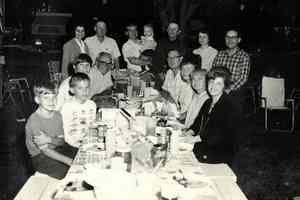













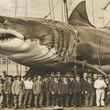
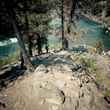
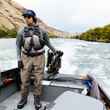








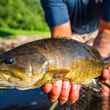


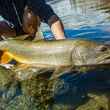

Comments
Liz Chrisman replied on Permalink
A descriptive, carefully crafted love letter to a vital component of you/your family's existence. You continue to inspire me and bring interest and honor to something that's "an old hat" to you. This made me want to be alongside you and experience it myself
Jock Conyngham replied on Permalink
Not all will agree with me, but I appreciate the thoughtful, emotional words of a real hunter hunting real animals in a real way, and then eating real food, rather than the bro-hugging, horn porn, video heavy crap that seems to have taken over the field.
Jonathan replied on Permalink
Hands down this is the most literat and emotional hunting article I have ever read. As I hunter it really touched me personally while simultaneously bringing back countless memories.
“Relief, sorrow, elation, reverence, empathy all swell within my heart, and all are anchored by an intense and primal satisfaction. The emotions radiate through my bones in tremors. “Thank you… thank you…” I whisper to the deer, to nothing, to everything.”
This quote as well as many others really spoke to me personally, as I have literally lived this word for word just last week.
This really helps me put all of those emotions into words and help me express my extreme gratitude to the white-tails, also my brothers.
mel church replied on Permalink
Best description and explanation of a deer hunt I've ever read. Reverence for the deer and the act. Thank you.
Pages